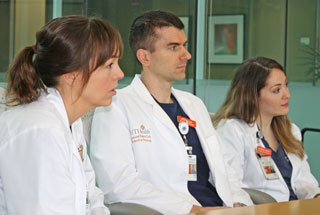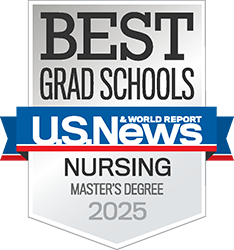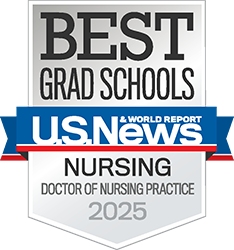Fellowship teaches selected Cizik School of Nursing BSN students to care for people with disabilities Second fellowship cohort gains skills and understanding about people with disabilities

.jpg/975w/jpegp)
(May 13, 2019) – When Allison Edwards, DrPH, RN, took undergraduate nursing students to clinical sites that serve people with intellectual and developmental disabilities, she observed that the students acted awkwardly.
“I noticed that they didn’t have the skill set to even communicate. They didn’t know what to do,” says Edwards, assistant professor in Cizik School of Nursing at UTHealth’s Department of Undergraduate Studies.
Because 61 million U.S. adults have a disability, according to the Centers for Disease Control and Prevention, there is a good chance that every nurse will care for a patient with a disability at some time.
“The students need to know how best to provide these patients with care. They need exposure to disabilities to transition into practice, because disabilities are universally experienced by everyone – in themselves or someone close to them at some point in their life,” Edwards says.
Edwards’ interest in people with disabilities originated with personal connections: an adopted brother with cystic fibrosis, two friends with children who have disabilities, and a brother-in-law, who recently passed away with complications from an intellectual disability.
“I feel that my career path has been pointing me in this direction for a long time, and I’ve always been involved with organizations that serve this vulnerable population,” Edwards says.
Edwards had recognized the need for training students to manage nursing care for people with disabilities when, unexpectedly, Houston philanthropists Joan and Stanford Alexander approached Cizik School of Nursing’s dean about making a donation to help the school serve this patient community. After a year of research and conducting a faculty needs assessment, Edwards wrote a proposal that led to a generous grant to establish the Joan and Stanford Alexander Fellowship in Intellectual and Developmental Disabilities.
With Edwards’ coordination, experiences in the Alexander Fellowship cover a broad range of disabilities – neurodevelopmental, acquired, progressive, pediatric, and adult – in a variety of settings, including inpatient, outpatient, clinic, and community.
Those eligible who are interviewed and selected for the fellowship each receive a $2,500 stipend toward the third semester tuition and take on a one-semester program of co-curricular study, in addition to an already fast-paced course load in the Pacesetter BSN program. Because of the demanding load and pace, at least a 3.5 GPA is required for the Alexander Fellowship.
Enrollment has steadily increased from four in the first cohort of fellows to seven in Cohort Three in spring 2019.
Best decision –
One member of the second cohort, Dawn Modic, says that deciding to become a nurse is by far the best decision she ever made, and her participation in the Alexander Fellowship is the best experience of her nursing career so far. Modic followed a winding path to her career choice – from forklift operator to retail sales and management, to a bachelor’s degree in kinesiology and nutrition at the University of Houston.
She was completing required observation hours for an application to a physical therapy program when she realized she wanted something different. “I was more enamored with what the nurses were doing. I was actually accepted into the Doctor of Physical Therapy program, and a week before I was supposed to start, I had a gut feeling, ‘This isn’t for me. I’m meant to be a nurse.’ I declined my offer and applied to nursing at UTHealth,” Modic says.
Hands on –
Through 90 hours of hands-on clinical and enrichment activities, the fellows rotate through about 10 primary, acute, and community care sites while working with interdisciplinary professionals. They take part in multidisciplinary rounds and present clinical case studies.
“At TIRR Memorial Hermann, the fellows get experience with urinary catheterizations, often performed in a patient’s wheelchair. At Baylor College of Medicine’s Transition Medicine Clinic, they do a lot of primary care, vaccinations, flu shots, and patient and caregiver education,” Edwards says. “Fellows learn to perform transfers from the wheelchair to the examination table or the stretcher to the table using a Hoyer lift. They’ve done tracheostomy suctioning and worked with some of the more acute patients. They have an opportunity to truly hone their communication skills and strategies when tasked with giving an injection to a patient with autism.”
Most of the students say they are entering the fellowship to broaden their experience and gain hands-on skills.
“But based on some qualitative research that I’m doing, at the end of the fellowship, they begin to think about it as a career path, and several nurses have commented that their interactions with people with disabilities now feel more natural as a result,” Edwards says. “One nursing student in the fellowship said, ‘You know, nurses don’t generally select this area, because it’s not a population they’re accustomed to in nursing school.’ That points to the reason why the students without training felt awkward. The attitudes, knowledge, and skill set they possessed weren’t what best served this population. More exposure meant more confidence. The fellowship experience elevates them to make them even better nurses with individuals who may or may not have a deficit or disability.”
Nursing and beyond –
Modic believes the experience will help not only in her profession, but also in her day-to-day life. She notes three big takeaways that transcend nursing:
- Learning to find the uniqueness in everyone and to care for the individual. “Many nurses are very methodical and analytical, and we have a tendency, because there are so many things you need to do, to think about medications, side effects, and all these co-existing diseases or conditions, but at the center of all that is an actual person. This fellowship taught me to remember that there is always a person.”
- Meeting patients where they are. For example, when Modic was caring for a patient with a recent amputation at the Michael E. DeBakey VA Medical Center, the patient didn’t want to look at the wound. Modic explained that it was normal for an amputee to go through a grieving process. “It helped validate his feelings and let him know that was OK, but also I let him know that there’s so much to look forward to.”
- Remembering the value of silence and just being present. For instance, at Texas Children’s Hospital Autism Center, Modic sat in on an initial screening for a two-year-old. At the end of the visit, the doctor told the mother that her child had autism spectrum disorder. “It was really hard to see someone in that vulnerable position. The physician had left, and I didn’t know what to say. I went over and grabbed her hand, and that felt comforting to her. It’s OK to not always know what to say. Sometimes just being present is as impactful as finding the right words.”
Four students from Cohort Two – Modic, plus David Ege, Andrea Leal and Marie Boswell –have shared their experiences in a YouTube video.
Thanks to Edwards’ inspired leadership and the Alexanders’ generosity, more focused training for nurses will produce better care for people with disabilities.
For more information about the program, visit go.uth.edu/cocurr.
– by Ina G. Fried | for UTHealth Public Affairs



